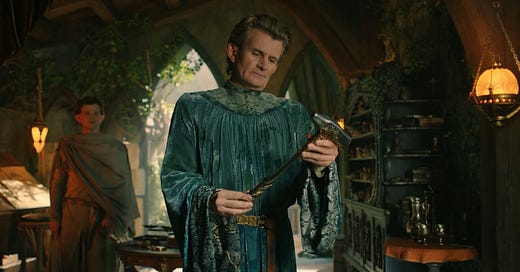Celebrimbor and Creation
Revisiting the first season of The Lord of the Rings: The Rings of Power in preparation for the debut of season 2 later this month, I was struck by a passing remark from the character of Celebrimbor (played by Charles Edwards). Celebrimbor is a crucial figure in J.R.R. Tolkien’s lore: the Elven smith who, in unwitting collaboration with the Dark Lord Sauron, forges the titular rings of power – many (though not all) of which will later be used by Sauron in his campaign to corrupt and tyrannize the denizens of Middle-earth. (Among other things, Celebrimbor has a part in creating the nine rings worn by the Nazgûl or Ringwraiths.)
Tolkien did not only write fantasy; he also wrote a great deal about fantasy, and his Middle-earth legendarium (the vast body of work that includes The Lord of the Rings and forms the basis for The Rings of Power) can be read as, among other things, an outworking of his theological ideas about what it means for a created being to be a creator. Tolkien spent much of his life making Middle-earth; not coincidentally, many of the stories of Middle-earth (including Celebrimbor’s) hinge on the relationships of makers with the things they make.
Austin M. Freeman’s essay “Sins of the Imagination,” included in the volume Theology, Fantasy, and the Imagination, has stayed with me since I read it early this year. Drawing from the history of Christian moral theology (and from Tolkien in particular), Freeman offers a framework for demarcating good or righteous fantasy from bad or sinful fantasy. Freeman characterizes good fantasy as an act of celebration; it sees the created world as a gift from God and responds to that gift in “a delighted impulse toward expansion rather than destruction.” On the other hand, sinful fantasy is an act of defiance that “abandons its proper order and attempts to set up a self-directed form of order, autonomous from creation.” The good fantasist reflects God’s creative work, while the sinful fantasist rejects it and seeks to replace God as creator. To put it another way, good fantasy is rooted in contentment, while sinful fantasy has its origin in discontentment:
In the end, the givenness of the world, once seen as a source of wonder and praise, “may manifest itself as a ‘cruel fact’ to be rallied against and rejected, the denial of a presumed birthright leading to a resentment toward or even a hatred of the given world… and to an artistry characterized above all by an exasperated struggle for liberation from limits and constraints of every kind.”
My mind jumped straight to Freeman’s essay during an exchange of dialogue in the second episode of The Rings of Power. Approaching the dwarven kingdom of Khazad-dûm, Celebrimbor effuses about the dwarves’ craftsmanship to his companion Elrond: “They sculpt the rock with the respect of one who cares for an aged parent.” When Elrond voices his surprise – after all, it is not typical for an elf to praise a dwarf in Tolkien’s world – Celebrimbor explains, “I admire all who can see into the mystery of things, who can divine from the plainness of what is the beauty of what could be.”
Celebrimbor’s description of the dwarves recalls Freeman’s definition of good fantasy. The dwarves’ artistry is rooted in their profound respect and love for the material they work with. There is a subtle irony, though, in the contrast between Celebrimbor’s own perspective and that of the dwarves he admires. It is telling – and, in light of Freeman’s definition of sinful fantasy, troubling – that Celebrimbor draws an opposition between “the plainness of what is” and “the beauty of what could be.” In Tolkien’s moral cosmos, the creation of that which “could be” ought to stem from a celebratory recognition of the beauty of “what is,” rather than a dissatisfied impulse to correct its “plainness.” This latent tendency towards discontentment with the world as it really is is the weakness through which Sauron can corrupt Celebrimbor and his creative work.




